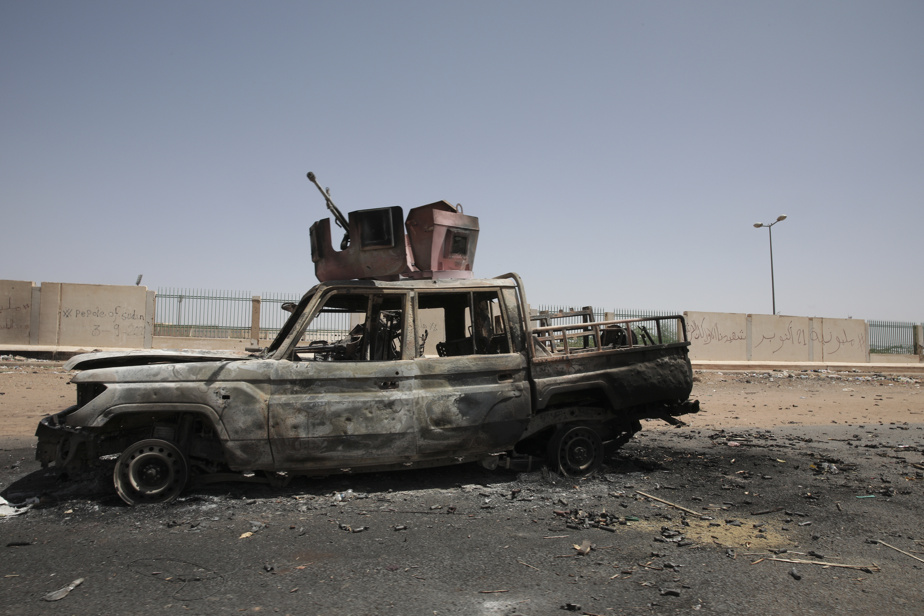(Khartoum) Soldiers and paramilitaries engaged in intense street fighting in Khartoum on Friday despite multiple calls for a ceasefire ignored by the two rival generals, on the first day of Eid al-Fitr marking the end of the holy month of ramadan.
At midday, airstrikes again shook the center of Khartoum, not far from the headquarters of the army general staff, witnesses said. The sound of weapons has been incessant since the night, as it has been daily since the start of the fighting on April 15, which left 413 dead and 3,551 injured, according to the World Health Organization (WHO).
New hospitals were heavily damaged in Khartoum, and four establishments were affected in al-Obeid, 350 km south of the capital, the doctors’ union said. In total, “70% of hospitals in the combat zone are out of service”, he adds.
The fighting has been going on for six days between the regular army of General Abdel Fattah al-Burhane, de facto leader of Sudan since the putsch of 2021, and the paramilitaries of the Rapid Support Forces (FSR) of General Mohamed Hamdane Daglo, mainly in Khartoum and in Darfur (West). Long latent and confined to political negotiations, the conflict between the two camps has turned into an armed struggle.
In Darfur, one of the poorest regions of Sudan, “the situation is catastrophic”, says a doctor from Médecins sans frontières (MSF).
“There are so many patients that they are treated on the floor in the corridors because there are simply not enough beds,” he said from this area where the Janjawid militiamen, the bulk of the troops of the FSR, committed atrocious abuses during the war started in 2003 by the dictator Omar el-Béchir, ousted in 2019.
The air force, which targets the FSRs scattered in residential areas, does not hesitate to drop bombs. In this chaos, “70% of the 74 hospitals in Khartoum and areas affected by the fighting have been put out of use”, reports the doctors’ union.
Diplomatic consultations are intensifying: the British Foreign Secretary, James Cleverly, has cut short a tour of Asia-Pacific “because of the situation in Sudan”.
On Thursday, UN Secretary General Antonio Guterres and US Secretary of State Antony Blinken called for a ceasefire for “at least” the three days of Eid.
In the eyes of Abdewahid Othmane, a 53-year-old man from Khartoum, the two rival generals “are fighting for power but they are not interested in the poor people who have no water or electricity and struggle to eat”. .
General Daglo had been General Burhane’s number two since the putsch of October 2021. The latter appeared Thursday for the first time since the start of hostilities on state television.
“For Eid, our country is bleeding: destruction, desolation and the sound of bullets have taken precedence over joy,” he said. So far, like his rival General Daglo, he had only spoken to the media and not directly addressed the 45 million Sudanese.
For its part, the United States has announced the sending of soldiers to the region to facilitate a possible evacuation of its embassies and nationals; South Korea and Japan will send planes while the airport has been closed since Saturday.
Mostly women and children crowd the roads to flee, between checkpoints and corpses.
The arms began to talk when the two generals failed to agree on the conditions for integrating the FSR into the regular troops, to finalize the political agreement on the return of civilians to power.
Since then, 10,000 to 20,000 people, mostly women and children, have crossed into neighboring Chad, according to the UN.
The two sides multiply the announcements of victory and accuse each other of having started or broken the multiple truces promised, assertions impossible to verify on the ground as the danger is permanent.
Aid workers were mostly forced to suspend aid after three World Food Program (WFP) staff were killed.
On Friday, the International Organization for Migration (IOM) announced the death of a humanitarian from this UN agency victim of an exchange of fire south of al Obeid.
“Neither Burhane nor Daglo seem to want to give in, the situation could get even worse,” said the International Crisis Group (ICG) research center.
“A long-lasting conflict would be the ruin of Sudan”, the third largest gold producer in Africa where more than a third of the population suffers from hunger, adds the ICG.

